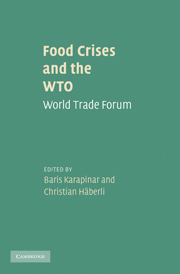Preface
Published online by Cambridge University Press: 12 May 2010
Summary
The World Trade Forum series was established to help spread the conviction that a multidisciplinary approach to international trade is warranted. The twelfth World Trade Forum was held on 26 and 27 September 2008 at the World Trade Institute of the University of Bern on ‘the Food Crisis and the World Trading System’. Food security being a matter of production, availability and access (and, in the case of the needy without resources, of food aid), international trade and hence the WTO play a critical role in shaping the roadmap required to achieve a stage at which poor people will have sustainable and stable access to the most basic of all human needs. Somewhat surprisingly, not much has been written on this particular aspect, and the ongoing Doha Round negotiations have not so far made substantial progress in addressing some important food security concerns such as export restrictions and the circumvention of export competition disciplines through international food aid. The interdisciplinary debates among the participants and the lively exchanges between scholars, practitioners and government officials reflected in every chapter in this book have thus produced very valuable insights and proposals for a way forward which would not only liberalise trade in agriculture but allow for more, and more sustainable, production incentives guaranteeing more food security for the poor.
Thus, we wish to thank the authors of the chapters in this book who have worked beyond the call of duty to accommodate the guidelines and suggestions of the editors.
- Type
- Chapter
- Information
- Food Crises and the WTOWorld Trade Forum, pp. xvii - xviiiPublisher: Cambridge University PressPrint publication year: 2010



